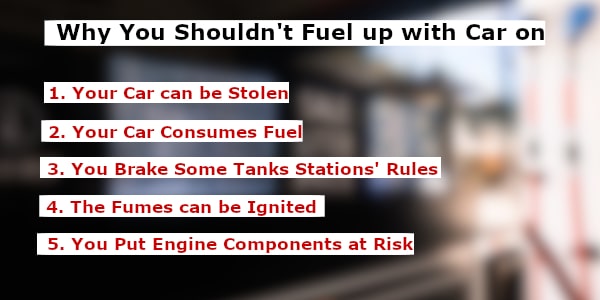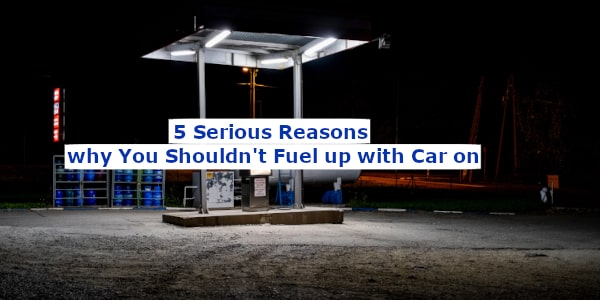Refueling our car is something we do with little thought or care about it. The truth is, though, you should be somewhat careful when stopping at a tank station.
One way of not being careful is keeping your engine on while topping up, and there are plenty of reasons why you shouldn’t.
Can you Fuel Up With the Car On?
You shouldn’t fuel up with the car on. A danger in filling your car when the engine is running can be static electricity. This form of electricity is an imbalanced charge clinging to conducting materials. At stations there are always fuel vapours hanging around, so static electricity can spark the vapours to ignite.
As a result, it’s advised you shouldn’t use your mobile, the cigarette lighter, or phone charger. Not only that, but the spark plugs in a gasoline engine help it combust fuel and at a quicker pace than a diesel engine too. This means there’s a slightly greater danger in filling a gasoline car than a diesel one when you still have it on.
Here, I’ll list off some of the small devices you should avoid in detail.
- Mobile phone: There’s some skepticism over whether they produce any static charge capable of igniting fuel. That said, you’re best not distracting yourself in an environment like a tank station.
- Cigarette lighter: Its name should clue you in on why it’s best not to put it in use when at a tank station.
- Phone charger: If you’re using one that plugs into the cigarette lighter, then you’re also risking static charges.
Another detail you should be wary of is starting your car while topping up on fuel. Because the engine is using greater amounts of fuel and electricity to start up, the risk goes up. The good news is the starter motor is usually nestled deep within the engine bay, so its chances of causing any unwanted fuel vapor ignition is highly unlikely.
With modern cars, refueling with the engine running idle isn’t as big a risk as with old ones. However, it’s better safe than sorry, so keeping the engine turned off should be done regardless. If you have an older car, then it’s highly advised not to ever keep the engine running idle.
Also read: Top 15 Cars that Turn off at Light & How Much Fuel They Save
5 Reasons why You Shouldn’t Fuel up Your Car with Engine on
Your Car Can be Stolen
Keeping your engine on as you refuel your car opens the door for thieves. Since your car will be unlocked and there being no need for a key, a thief can swoop in and drive off. This is a risk that heightens and lowers depending on the location, of course.
Keeping your keys on you, switching off the engine and locking the car can prevent such an event. This would be especially wise during night time, the most likely time of day when cars are stolen. It can take one moment where you’re not paying attention and someone gets in your car and drives off.
The fact your car is running means the thief wouldn’t need to worry about using a key or hotwiring it. They could speed off before you could properly react. Although modern cars carry greatly reduced chances of an accident occurring when being fuelled with its engine running, the threat of it being stolen remains the same as it would with an older car.
Read it: How Does Immobiliser Work? (Simply Explained)
Your Car Consumes Fuel
Even if the engine is just running idle, you’re still wasting valuable fuel. This brings a humorous irony to how you’re trying to refuel your car.
Even if you have no risk of fire, the question of if you can fuel up with the car on still has the same answer: it’s not advised. Only in this case, it’s more risk of costs than a risk of safety. An engine running idly won’t exactly burn away fuel like there’s no tomorrow, but as the saying goes, “waste not, want not.”
Even if you’re not too short on money for fuel, switching off your car when you’re not using it is a good habit to get into. You might only stop briefly at times, but it’s worth turning it off most times for saving fuel, money, and, in the case of refueling, hazards.
Just remember, depending on engine size, you can waste up to half a gallon of fuel in an hour with the engine running. While you’re most likely to have it running for just a few minutes, you’re going to be throwing away money that doesn’t need to be spent in this way.
You Brake Tank Stations’ Rules
Some tank stations are not only well aware of the dangers of fuelling up with the car running but have rules in place to counter them. It’s why you’ll find stations that don’t allow idle running engines. This is only fair, seeing that in the worst-case scenario, the station could end up with a costly repair bill.
Trending Video: How to Easily Bring Back to Life any Old Car Battery and Save Tons of Money (click to watch)
In this worst-case scenario, where an idle running engine causes fuel vapors to ignite, then there’s little doubt damage will be done to at least part of the station. Understandably, station owners want to minimize the risk, so rules that help prevent hazards are put in place.
Although we treat tank stations with a casual attitude, they are still places that need caution. Many bad accidents have occurred in tank stations, where injury and building damages have resulted. A number of these accidents have been caused by static charges that can be caused by running engines.
Keeping the engine off avoids any such issues the station may have and will keep your own risk down as well as theirs. After all, when it comes to any aspect of motoring, safety really does come first.
Also read: 5 Costly Reasons to not Run a Car on Low Fuel
The Fumes Could be Ignited
Although mentioned above, the dangers of a tank station’s fuel vapors igniting cannot be overstated. It can take even less than a lit match to make fuel turn into a fiery mess which is why a responsible approach should always be taken when handling fuel.
Keeping your engine turned off is one of the best measures to take when refueling if you want to avoid such risk. Tank stations are always going to have fuel that’s left on the floor, or hanging around as vapors and thus become a potential danger in the right conditions.
As well as the dangers, you can end up in serious legal trouble if a disastrous ignition occurs and, inevitably, causes damages. You could end up with a fine in some cases, depending on the severity of the event.
Then there’s the possibility of injury to yourself and others. Burning fuel is a sudden and violent reaction that can lead to burns of varying severity. Such events could even be deadly in the absolute worst events. Once again, there would be serious legal consequences should this happen to innocent bystanders.
While there are smaller reasons for keeping your engine off when filling up the car, this is by far the main concern. Gasoline fires are something you will want to take all precautions against. There’s a lot of video footage showing when it all goes wrong, which would convince anyone to play it safe.
You Put Engine Components at Risk
Having an engine running idle for excessive periods of time can wear down parts. You can potentially damage cylinders and spark plugs as the engine isn’t running at its optimum temperature. This means fuel isn’t fully combusting, leaving behind residue that winds up on the spark plugs and condensing on the cylinder walls.
This residue leaves the spark plugs dirty and increase fuel consumption by 5% and to add to the problem, water can condense inside the exhaust, which could corrode it if you’re not careful.
As you might expect, such damages caused by idling will lead to heavy repair bills. The exhaust system and the cylinders are not what you’d call the cheapest parts on the shelf.

All these issues will likely happen if you get into the habit of leaving your car running a lot. It’s also emitting unneeded carbon emissions, so it’s not an environmentally friendly practice either. Keeping the engine off will do your car far more good and will reduce possible repairs and increase the engine’s lifespan.
I hope you enjoyed this guide and got the answers you were looking for. Fuelling up always carries some level of risk, though normally it’s very, very small. However, with an engine still running you do increase the danger factor which is unnecessary and should be avoided.
Keeping an engine off saves you money, does not carry any chance of a fire hazard, reduces chances of mechanical failure and will stick to some stations’ rules. There are times where we can’t be bothered with turning off our car, but in the end, you’re going to do yourself more harm than good.
We tend to take things for granted when it comes to refuelling stations, but we should use a bit of caution when there. It can mean the difference between being safe and having a bad accident.


